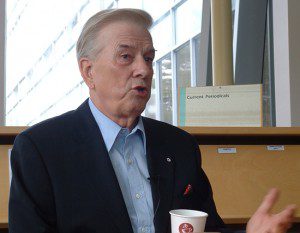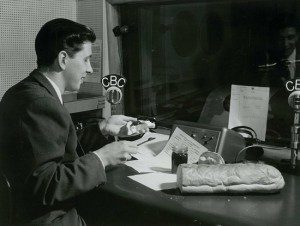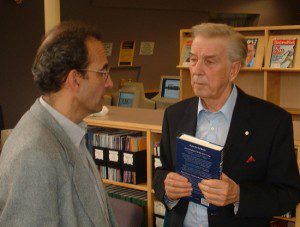
It seems commonplace now, but for a long time those working in the media were not considered able, nor in some cases were they allowed, to do two things at the same time. Today it’s called multi-tasking. Thirty-five years ago, it was considered a violation of the working agreement between workers and managers in the media. The first person to break that barrier in Canadian news media will leave his revered spot on the air later this week.
“Unions were so powerful [when I worked] at the CBC,” Lloyd Robertson told a group of journalists a few years ago. “As an announcer there, all I was allowed to do was pick up news copy and read it on the air.”
In 1976, the then 42-year-old Lloyd Robertson had reached what seemed the pinnacle of a broadcasting career – he was TV anchor on the most respected news program in Canada – the CBC’s The National. Despite the authority of that position (remember this was in an era when CBS TV anchor Walter Cronkite was considered “the most trusted man in America,”) Robertson chafed at the restrictions of his job.

Being classified as a CBC announcer, he was not allowed to write his own scripts nor participate in the news decision-making of the day’s newscast. After six years in the top spot at CBC he walked away.
“I talked to close friends over the seven days that heavy negotiations were going on,” he told me in an interview at the time. “And I chose CTV.”
About six years ago, the man who left CBC for CTV (first co-hosting the CTV National News with Harvey Kirck before handling it solo in 1983,) visited the college where I teach to offer reflections and encouragement to many of my journalism and broadcasting students. Lloyd Robertson reminisced about his earliest days as a disc jockey (in 1952) on CJCS Radio in Stratford, Ont., “where there was no news and no sports, just a guy spinning records.”
Nor were there journalism schools or broadcasting schools when he got into the business; so he learned to research and report by teaching himself. That’s why not being allowed to write the news he was presenting to the nation (when he anchored the news at CBC from 1970 to 1976,) seemed anathema, so foreign to him.
“I made the move [to CTV] and never looked back,” he told my student reporters. And that’s been his attitude ever since.
The Order of Canada member and Canadian Association of Broadcasters Hall of Fame honouree has reported on every major event in this country – from Canada’s Expo ’67 in Montreal, to the marriages of most of the Queen’s offspring, to federal campaigns leading to the elections of Prime Ministers Diefenbaker, Pearson, Trudeau, Clark, Turner, Mulroney, Campbell, Chretien, Martin and Harper.
In conversation with his CTV colleagues on air this week, Robertson admitted to the difficulty of anchoring the tougher stories, such as the Boxing Day tsunami in 2004, the death of Princess Diana in 1997 and the near breakup of Canada during the Quebec referendum in 1995.

I remember the news coverage that night, Oct. 30. The entire country, it seemed, was flying apart in emotional upheaval. The legally elected Quebec government had decided to take the issue of Quebec separation from Canada (or “Quebec sovereignty association” as it was euphemistically described) to its provincial electorate. What had seemed a cakewalk for the “Non” (pro-Canada) side, on referendum night swung quickly to the “Oui” (separation) side.
I watched TV news reportage of all the networks (CBC, CTV and Global,) that night, but it seemed to me that Robertson’s reporting and reaction were the most genuine. The vote ended up Non with 49.42 per cent versus Oui with 50.58 per cent.
“Whew,” Lloyd commented honestly as the broadcast concluded. “It’s the end of a very long night for us. But Canada is still in one piece.”
Like Cronkite, Lloyd Robertson has earned the moniker of “trustworthy.” Indeed, not so long ago, Reader’s Digest polled Canadians on which 10 people they trusted most. Lloyd Robertson came in fifth place after the Queen, Mike Holmes, Michael J. Fox and David Suzuki. He lived up to that trust again on perhaps his toughest assignment ever – anchoring CTV’s live coverage of events in the United States and Canada on the morning of Sept. 11, 2001.
“I rushed into the newsroom… not knowing what was going to happen,” he told my students a few years ago. “Sometimes your experience gets you through moments like that.”
I can’t imagine any anchor surviving such an assignment only being allowed to read what was handed him (like the old CBC days). But because Lloyd Robertson chose to stand up for his principles and his experience 35 years ago, Canadian TV journalism is a better workplace and a better witness to news of the world and Canada.